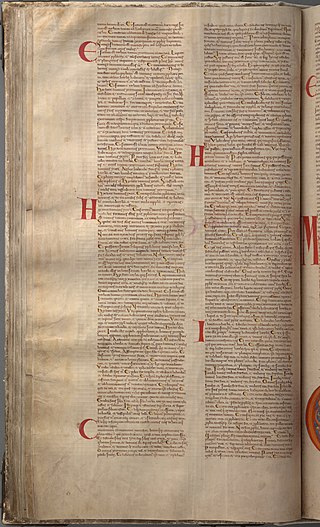
Zechariah 12 is the twelfth of the 14 chapters in the Book of Zechariah in the Hebrew Bible and the Old Testament of the Christian Bible. This book contains the prophecies attributed to the prophet Zechariah, and is a part of the Book of the Twelve Minor Prophets. This chapter is a part of a section consisting of Zechariah 9–14. This chapter and chapter 13 verses 1–6 are a section, forming a three-section "entity" with 13:7–9 and 14:1-21.

Micah 3 is the third chapter of the Book of Micah in the Hebrew Bible or the Old Testament of the Christian Bible. This book contains the prophecies attributed to the prophet Micah, and is a part of the Book of the Twelve Minor Prophets.

Zechariah 3 is the third of the 14 chapters in the Book of Zechariah in the Hebrew Bible or the Old Testament of the Christian Bible. This book contains the prophecies attributed to the prophet Zechariah, and is a part of the Book of the Twelve Minor Prophets. The chapter contains the vision of Joshua, the high priest, being cleansed before God. It is a part of a section consisting of Zechariah 1–8.
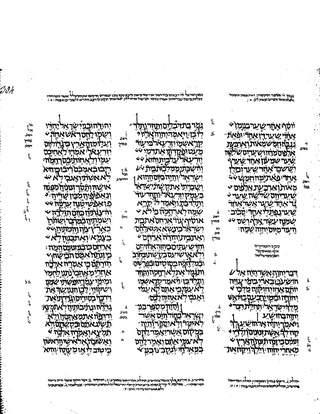
Zechariah 2 is the second of the 14 chapters in the Book of Zechariah in the Hebrew Bible or the Old Testament of the Christian Bible. This book contains the prophecies attributed to the prophet Zechariah, and is a part of the Book of the Twelve Minor Prophets. This chapter is a part of a section consisting of Zechariah 1–8. It records the third of eight visions received by the prophet, followed by an oracle calling the exiles to return to the city where Yahweh is about to dwell and all nations will come.

Zechariah 6 is the sixth of the 14 chapters in the Book of Zechariah in the Hebrew Bible or the Old Testament of the Christian Bible. This book contains the prophecies attributed to the prophet Zechariah, and is a part of the Book of the Twelve Minor Prophets. This chapter contains the description of the eighth vision and the crowning of Joshua. It is a part of a section consisting of Zechariah 1–8.
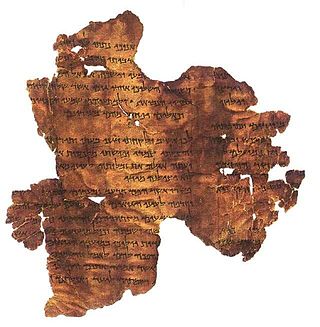
Hosea 13 is the thirteenth chapter of the Book of Hosea in the Hebrew Bible or the Old Testament of the Christian Bible. In the Hebrew Bible it is part of the Book of the Twelve Minor Prophets. The subject of this chapter and the following one is the idolatry of the Kingdom of Israel, referred to as Ephraim, notwithstanding God's past benefits, destined to be the country's ruin.
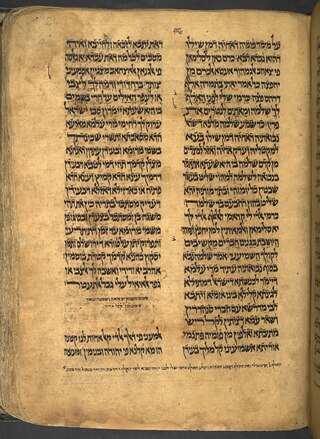
Lamentations 2 is the second chapter of the Book of Lamentations in the Hebrew Bible or the Old Testament of the Christian Bible, part of the Ketuvim ("Writings").

Lamentations 3 is the third chapter of the Book of Lamentations in the Hebrew Bible or the Old Testament of the Christian Bible, part of the Ketuvim ("Writings").
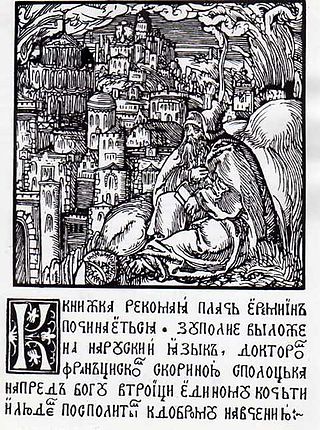
Lamentations 4 is the fourth chapter of the Book of Lamentations in the Hebrew Bible or the Old Testament of the Christian Bible, part of the Ketuvim ("Writings").

Jeremiah 47 is the forty-seventh chapter of the Book of Jeremiah in the Hebrew Bible or the Old Testament of the Christian Bible. This book contains prophecies attributed to the prophet Jeremiah, and is one of the Books of the Prophets. This chapter is part of a series of "oracles against foreign nations", consisting of chapters 46 to 51. In particular, chapters 46-49 focus on Judah's neighbors. This chapter contains the poetic oracles against the Philistines.

Jeremiah 8 is the eighth chapter of the Book of Jeremiah in the Hebrew Bible or the Old Testament of the Christian Bible. This book contains prophecies attributed to the prophet Jeremiah and is one of the Books of the Prophets. Chapters 7 to 10 constitute an address delivered by Jeremiah at the gate of the Temple in Jerusalem.

Jeremiah 14 is the fourteenth chapter of the Book of Jeremiah in the Hebrew Bible or the Old Testament of the Christian Bible. This book contains prophecies attributed to the prophet Jeremiah, and is one of the Books of the Prophets.

Jeremiah 17 is the seventeenth chapter of the Book of Jeremiah in the Hebrew Bible or the Old Testament of the Christian Bible. This book contains prophecies attributed to the prophet Jeremiah, and is one of the Books of the Prophets. This chapter includes the third of the passages known as the "Confessions of Jeremiah".

Jeremiah 19 is the nineteenth chapter of the Book of Jeremiah in the Hebrew Bible or the Old Testament of the Christian Bible. This book contains prophecies attributed the prophet Jeremiah, and is one of the Books of the Prophets.

Jeremiah 20 is the twentieth chapter of the Book of Jeremiah in the Hebrew Bible or the Old Testament of the Christian Bible. This book contains prophecies attributed to the prophet Jeremiah, and is one of the Books of the Prophets. This chapter includes the fifth of the passages known as the "Confessions of Jeremiah".

Jeremiah 21 is the twenty-first chapter of the Book of Jeremiah in the Hebrew Bible or the Old Testament of the Christian Bible. This book contains prophecies attributed to the prophet Jeremiah, and is one of the Books of the Prophets. This chapter contains a record of Jeremiah's message to King Zedekiah's emissaries and a warning to the House of David.

Jeremiah 33 is the thirty-third chapter of the Book of Jeremiah in the Hebrew Bible or the Old Testament of the Christian Bible. It is numbered as Jeremiah 40 in the Septuagint. This book contains prophecies attributed to the prophet Jeremiah, and is one of the Books of the Prophets.

Jeremiah 46 is the forty-sixth chapter of the Book of Jeremiah in the Hebrew Bible or the Old Testament of the Christian Bible. This book contains prophecies attributed to the prophet Jeremiah, and is one of the Books of the Prophets. This chapter is part of a series of "oracles against foreign nations", consisting of chapters 46 to 51. In particular, chapters 46-49 focus on Judah's neighbors. This chapter contains the poetic oracles against Egypt.

Jeremiah 48 is the forty-eighth chapter of the Book of Jeremiah in the Hebrew Bible or the Old Testament of the Christian Bible. This book contains prophecies attributed to the prophet Jeremiah, and is one of the Books of the Prophets. This chapter is part of a series of "oracles against foreign nations", consisting of chapters 46 to 51. In particular, chapters 46-49 focus on Judah's neighbors. This chapter contains the poetic oracles against Moab.

Jeremiah 43 is the forty-third chapter of the Book of Jeremiah in the Hebrew Bible or the Old Testament of the Christian Bible. This book contains prophecies attributed to the prophet Jeremiah, and is one of the Books of the Prophets. This chapter is part of a narrative section consisting of chapters 37 to 44. Chapters 42-44 describe the emigration to Egypt involving the remnant who remained in Judah after much of the population was exiled to Babylon. In this chapter, Jeremiah performs in Egypt one of the sign-acts distinctive of his prophetic style.


![The word /v@na'suba/ in Ekhah (Lamentations) 5:21. The ga'ja in the word (marked in red) renders the shva stressed. In the Spanish and Portuguese Sephardic tradition, the pronunciation is ['vana'suba]. Ga'ya.png](http://upload.wikimedia.org/wikipedia/commons/thumb/9/94/Ga%E2%80%98y%C3%A1.png/220px-Ga%E2%80%98y%C3%A1.png)








